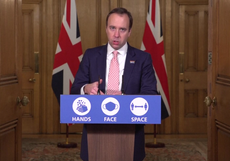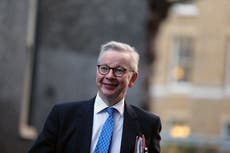Coronavirus: Vaccinating UK population will cost £12bn
Government 'right to back number of horses’ but accountability contracts ‘highly unusual’, says MP
Your support helps us to tell the story
From reproductive rights to climate change to Big Tech, The Independent is on the ground when the story is developing. Whether it's investigating the financials of Elon Musk's pro-Trump PAC or producing our latest documentary, 'The A Word', which shines a light on the American women fighting for reproductive rights, we know how important it is to parse out the facts from the messaging.
At such a critical moment in US history, we need reporters on the ground. Your donation allows us to keep sending journalists to speak to both sides of the story.
The Independent is trusted by Americans across the entire political spectrum. And unlike many other quality news outlets, we choose not to lock Americans out of our reporting and analysis with paywalls. We believe quality journalism should be available to everyone, paid for by those who can afford it.
Your support makes all the difference.Vaccinating the population against coronavirus will cost taxpayers up to £11.7bn, the public spending watchdog has estimated.
The National Audit Office (NAO) said the sum would be spent buying and making Covid-19 jabs for the UK, deploying them in England and helping global efforts to find a vaccine.
But the figure does not cover the costs of any future potential multi-year vaccination programmes.
The costs to the taxpayer are uncertain and depend on how vaccines develop through clinical trials and what is required to manufacture and administer them, the NAO said.
And it warned the taxpayer may incur additional costs because the vaccine contracts contain a form of indemnity protection for the pharmaceutical companies in case of any legal action arising from adverse effects from the vaccines.
No cap has been applied to the amount the government could have to pay if there is a successful claim against the companies in four of the five contracts agreed so far, the NAO said.
The UK has ordered 100 million doses of the Oxford-AstraZeneca vaccine, as well as 40 million of the Pfizer/BioNTech, seven million of the Moderna, 60 million of Valneva SE, and 60 million of the Novavax Inc jabs.
The Pfizer vaccine is already being rolled out by the NHS after it was approved by the regulator.
Labour MP Meg Hillier, who chairs the Commons Public Accounts Committee, said the government was right to have backed a "number of horses" but that the accountability arrangements were "highly unusual".
She said: "It was clearly right to back a number of horses - nobody could have known which vaccines would work or when they might be approved - but the accountability arrangements were highly unusual, even though huge sums of money are involved.
"The organisations who know how to carry out mass vaccination campaigns didn't always have a seat at the table when decisions were taken.
"The logistical challenges of vaccinating tens of millions of people - on top of the other pressures on the NHS - can't be underestimated. We aren't over the finish line yet, and the vaccination programme must not fall at the last hurdle."
Gareth Davies, the head of the NAO, said: “Government has worked quickly and effectively to secure access to potential vaccines, using the available information to make big decisions in an inherently uncertain environment.
“With one vaccine now approved for use and its rollout started, significant challenges remain.
“Efficient delivery to the UK population presents complex logistical challenges and requires excellent communication with the public.”
A spokesperson for the Department for Business, Energy and Industrial Strategy (BEIS) added: "As the report rightly notes, we have worked at a pace and scale never been done before to ensure the British public receive a vaccine that meets strict safety standards as quickly as possible.
"The UK was the first country in the world to procure and authorise the Pfizer/BioNTech vaccine and to begin a vaccination programme last week.
“Thanks to the work of our Vaccine Taskforce, the UK is now in an exceptionally strong position with a diverse portfolio of 357 million doses of some of the world's most promising vaccine candidates.
"To ensure our country is in the best position to make any Covid-19 vaccine available as quickly as possible and respond to future pandemics, we have worked to build an entire domestic vaccine manufacturing base from scratch by investing in state-of-the-art facilities across the country."
Additional reporting by PA






Join our commenting forum
Join thought-provoking conversations, follow other Independent readers and see their replies
Comments